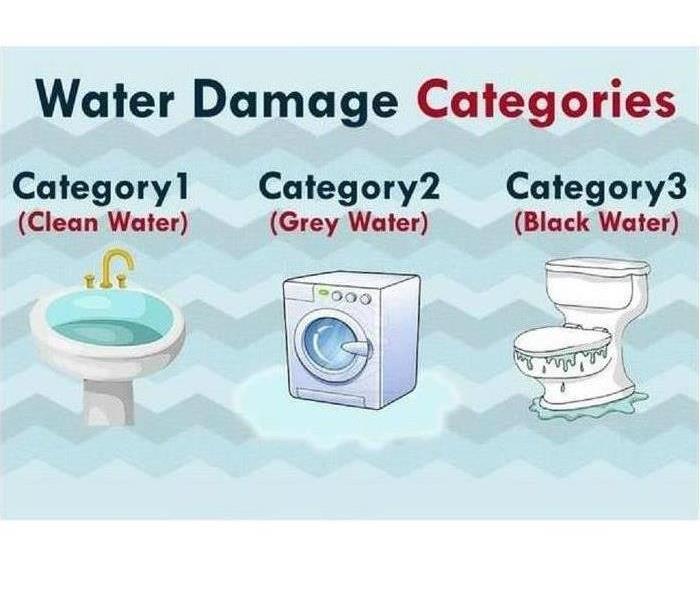Flood Water Contamination Categories
9/17/2020 (Permalink)
When you have flooding in your building, how safe is it? What is it carrying throughout your room? In the restoration industry, we have categories that we use to describe the type of water involved in a flood.
Category 1
Category 1 water is clean. This water must come from a sanitary water source. When a water supply line breaks, a tub overflows, or fresh rain leaks through a roof, the water starts out as a category 1. Once the water picks up debris or chemicals from the walls or ground or begins to grow bacteria from sitting in place, this categorization can change, but as long as it’s in category 1, water is considered safe.
Category 2
Category 2 water is also called “grey water.” This water carries chemicals or biological contamination. Examples of grey water include flooding that comes out of washing machine or dishwasher (as compared to flooding that comes from the water source into the machines). This water may appear either clear or dingy, but still contains chemicals, soap, or particulate from the dishes or laundry.
Category 2 water can also be created as clean water sits and deteriorates. As mold forms in the water, it changes the contamination level of the flooding.
While grey water isn’t safe for humans to drink or wash in, it isn’t totally useless. Don’t forget that category 2 water is still safe enough to water plants or wash a sidewalk.
Category 3
Category 3 water is often called
black water." This is water that has been grossly contaminated beyond any safe use. Water can become category 3 if sewage backs up or if there is runoff that contains pesticides or toxic chemicals. Wind-driven rain from storms or rising water from flooding bodies of water are also considered category 3.
Just because water is considered “black” does not mean that it will actually appear dirtier than the other categories. It’s always important to take precautions when entering a flooded area, whether it looks dirty or not.
Partner with Professionals Who Know Water
When you’re experiencing water damage, you should always feel comfortable asking your restoration team any questions you have about the water contamination and its effect on the repair process. A good and compassionate professional will take the time to explain what you’re dealing with in your building.
If you have water damage and would like SERVPRO of Sunland/Tujunga to evaluate your needs, call us at 818-951-6780.




 24/7 Emergency Service
24/7 Emergency Service